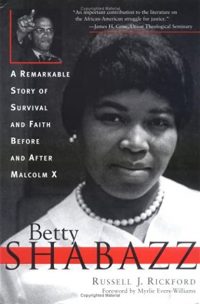She had once been threadbare, with seven lives to weave from darkness
 Betty Shabazz: a Remarkable Story of Survival and Faith Before and After Malcolm X
Betty Shabazz: a Remarkable Story of Survival and Faith Before and After Malcolm X
by Russell J Rickford
A late-night read on my Kindle while trying to get the dog to sleep, I was starting to feel bad about how long it was taking me to read this autobiography until I saw on Goodreads that it’s over 600 pages. In fairness Dr Betty Shabazz lived a full and fascinating life that deserves every one of those pages. She was so much more than Mrs Malcolm X, though of course that marriage made her famous and opened the door for her to be an activist and ambassador.
Rickford says in his introduction that he will concentrate on Betty’s life before and after Malcolm, but inevitably their seven years of marriage form a lot of the narrative and at times this veers into being yet another Malcolm X or Nation of Islam biography. He also refers to her as “the widow” a lot, which somewhat undermines his stated mission to depict her as more than that role. Not that it was easy role to hold.
“So it went in the temple. Women were precious objects, but objects nevertheless…They studied English, penmanship, refinement, beauty, hygiene and art. According to Malcolm, such graces spared black women from Western corruption. He said that Western civilisation had destroyed women’s femininity…The movement was so patriarchal that many of the men began referring to themselves in the divine third person.”
That said, this is a thorough and revealing account of a woman who was fiercely private. She went through some serious shit and tended not to share with anyone outside her most innermost circle. Which does mean the information Rickford is able to include sometimes feels off-balance. He recounts every minute detail of Malcolm’s death and previous assassination attempts, but the fact that of Malcolm and Betty’s six daughters, one dropped out of high school and another became a young, single parent is dropped in with no information about how those events affected Betty – at least until several years later when Betty was caring for her grandson on and off while her daughter fought drug problems and FBI entrapment, which is covered more fully.
Rickford drops in some statements about the FBI harassing Malcolm X with abusive phonecalls that assume a certain level of knowledge about the famous man that I don’t have, so I guess now I have to add at least one Malcolm X biography to my TBR. But I am glad to have learned about Dr Betty Shabazz – a woman who could have led a quiet, reserved life as a nurse but fell in love with a charismatic religious and political leader who changed all her plans. After Malcolm’s death, the still-young Betty put herself through graduate school and became an international expert in health education. She used Malcolm’s name and fame to get her voice heard when she felt it mattered, but stayed firmly in the shadows as much of the rest of the time as the world would allow.
“Black women of all stations empathized with Betty. They knew that she had once been threadbare, with seven lives to weave from darkness. They knew the trauma of the black woman’s burden – to stay strong and resilient through crises. So they rallied in the spirit of their foremothers, who a century before had formed clubs to resist the treachery of Southern white men who routinely cast them as unchaste.”
It was really interesting to read this at the same time as watching the BBC drama Mrs America, which follows a chunk of the same time period and many of the people Betty met and appeared publicly with where her feminism and civil rights activism intersected. Rickford makes it clear that however much Betty loved her husband, she did not appreciate the severity of the rules he imposed on her and after his death she quickly dropped those rules she had disagreed with.
Rickford’s style can be a little dry and occasionally repetitive, but overall I liked this book and am glad to know about this amazing woman.
Published 2003 by Sourcebooks.
Source: Humble Bundle